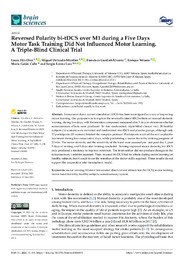Título :
Reversed Polarity bi-tDCS over M1 during a Five Days Motor Task Training Did Not Influenced Motor Learning. A Triple-Blind Clinical Trial |
Autor :
Flix Díez, Laura 
Delicado Miralles, Miguel 
Gurdiel-Álvarez, Francisco 
Velasco Serna, Enrique 
Galán Calle, María 
Lerma Lara, Sergio  |
Editor :
MDPI |
Departamento:
Departamentos de la UMH::Patología y Cirugía |
Fecha de publicación:
2021-05-25 |
URI :
https://hdl.handle.net/11000/34185 |
Resumen :
Transcranial direct current stimulation (tDCS) has been investigated as a way of improving motor learning. Our purpose was to explore the reversal bilateral tDCS effects on manual dexterity training, during five days, with the retention component measured after 5 days to determine whether somatosensory effects were produced. In this randomized, triple-blind clinical trial, 28 healthy subjects (14 women) were recruited and randomized into tDCS and placebo groups, although only 23 participants (13 women) finished the complete protocol. Participants received the real or placebo treatment during five consecutive days, while performing a motor dexterity training program of 20 min. The motor dexterity and the sensitivity of the hand were assessed pre- and post-day 1, post 5 days of training, and 5 days after training concluded. Training improved motor dexterity, but tDCS only produced a tendency to improve retention. The intervention did not produce changes in the somatosensory variables assessed. Thus, reversal bi-tDCS had no effects during motor learning on healthy subjects, but it could favor the retention of the motor skills acquired. These results do not support the cooperative inter-hemispheric model.
|
Palabras clave/Materias:
Motor learning
Bilateral transcranial direct current stimulation (bi-tDCS);
Motor training
Motor hand dexterity
Healthy subjects
Somatosensory system |
Tipo de documento :
info:eu-repo/semantics/article |
Derechos de acceso:
info:eu-repo/semantics/openAccess
Attribution-NonCommercial-NoDerivatives 4.0 Internacional |
DOI :
https://doi.org/10.3390/ brainsci11060691 |
Publicado en:
Brain Sciences. 2021 May 25;11(6):691 |
Aparece en las colecciones:
Artículos Patología y Cirugía
|

 La licencia se describe como: Atribución-NonComercial-NoDerivada 4.0 Internacional.
La licencia se describe como: Atribución-NonComercial-NoDerivada 4.0 Internacional.
.png)